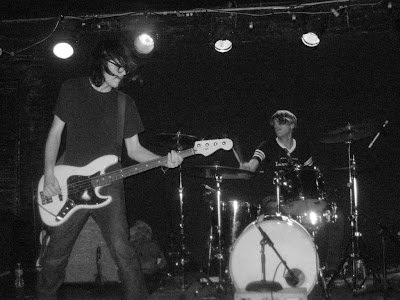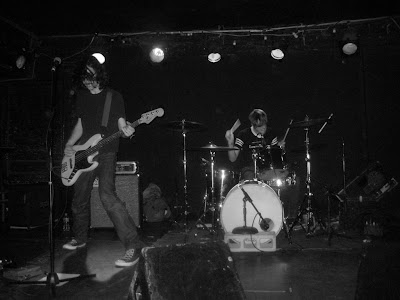BILL: What? Me on crutches and you in a sling? I can't stand it any more!!!!
MATTHEW: Yeah; it's like the end of El Dorado.
Then I sent him this picture:

To which Bill responded:
BILL: That is the funniest thing I've seen in a long time!!!!!! Oh God, how do you do it?
What can I say? I have a magpie mind, and a database of jpegs to match. And a pile of DVD's too. I spent the rest of the day thinking, "Y'know, it's been a few months since I saw El Dorado; maybe I'll pull it out and watch it again tonight." And I did. Instead of writing, of course; because (just as there must always be a novel, and it must always be a Russian novel) there must always be a movie, and it must always be a Western movie, when Matthew is procrastinating about writing.

So why this Western movie? Here’s the plot in a nutshell. Hired gun Cole Thornton (John Wayne) rides into El Dorado to take a job from Bart Jason (Ed Asner), but when his old friend JP Harrah (Robert Mitchum), the town sheriff, tells him that the job entails helping Jason get the deed to the water-rich McDonald Ranch, Wayne literally backs out of the job. On his way back to town, he mistakenly shoots one of the McDonald boys, and when the kid finishes the job by putting a gun to his head, Thornton delivers the body to the boy’s family, and then rides away from that as well, only to be ambushed and shot in the back by Joey, the dead boy’s sister. The bullet turns out to be too close to Thornton’s spine to operate, and a few days later he rides out of town to take a job in a mining town.
Six months later, Thornton rides into a different town, and watches Mississippi (James Caan) kill the last of four men who murdered his friend Johnny Diamond. The dead man works for Nelse McLeod (Christopher George), a gunslinger who is just as fast as Wayne, and who has just been hired for the job that Thornton gave up six months ago. McLeod figures it’s easy pickin’s because Sheriff Harrah is now a drunk, thanks to being jilted by a girl. This is the one piece of news that finally sends Thornton back to El Dorado to (a) reprise the drunken sidekick plot of Rio Bravo with Mitchum in the Dean Martin role and (b) help his friend and side with the McDonalds against Bart Jason. Y’know, like he should have done in the first place. Like John Wayne (being John Wayne) would have done in the first place, right?
Sorry. Not this movie. This is a movie about a man who rides away from everything, as evidenced by the clip below. Since most of my friends know how devoted I am to making over-the-top generalizations, it should come as no surprise when I say that there is no other scene in a John Wayne movie, let alone an American Western, where you will see the following action take place:
It's almost shocking, isn't it? A Western hero retreating. Hell--John Wayne retreating. Literally backing away from a fight. (And check out the Nelson Riddle horns at the end. That same refrain shows up at least once in every episode of Batman.) But this one sequence is what the whole movie is about. People backing away from or not owning up to their responsibilities, to what they owe other people because of their actions.

Take Cole Thornton. He's been paid in advance to work for the bad guy, but he chooses not to. It's never stated outright that he doesn't want to get involved on either side of this battle, but the way he backs out of that scene says it a lot stronger than any words could. Here's a man who knows that if he accepts this job, he'll be doing evil. So he doesn't. But is not doing evil enough? Not the way this movie works. 90 seconds after renouncing evil, one of the McDonald boys takes a wild shot at Thornton and Thornton plugs him in the stomach. The gut-shot kid knows this is a certain death sentence, and finishes himself off. What does Thornton do? He does the decent thing and returns the boy's body to his family; and then rides off again. He doesn't say, as you would expect the Good Guy to say--as you would expect John Wayne to say--"I owe you for the death of your son, so I'm taking his place until this war with Bart Jason is over." Instead, he tries to put some of the blame on the boy's father, for telling the kid what happens to a man who gets gut-shot, and rides off again.

This is not a nice human being, okay? He's not even the nicest guy in the movie. Most people would probably give that title to James Caan's ingenue sidekick, but for my money, it's bad guy Nelse McLeod by a mile. Thanks to a career-best performance by Christopher George, McLeod is just so damn pleasant and cheerful you don't care that he kills people for a living and has no scruples. He's a total professional, and he's relaxed with it. He even dies with a sense of humor. Cole Thornton, on the other hand? About as cuddly as a cactus. Thornton is somebody who doesn't give a shit about anybody, good or bad, except himself. Somebody who is, in essence, a coward, which the movie spells out pretty clearly when Joey McDonald ambushes Thornton and shoots him off his horse. Where does she shoot him? In the back. Which is physically impossible, given the angle of fire as we're watching the movie. But we accept it, because it makes thematic sense. In its own way, it's flawlessly logical: (1) Only cowards who run away from a fight get shot in the back. (2) Cole Thornton has a bullet lodged in his back. Therefore (3) Cole Thornton is a coward. And to make it even more obvious, what happens to Thornton every time that bullet rubs up against his spine? His gun hand goes numb. Because he refused to recognize a debt he owed the McDonalds, his gun hand is useless.

You probably think I'm reading too much into what is essentially a sauntering entertainment, but believe me, it all fits. The first time we see Thornton's gun hand go numb? Right after he finds out from McLeod that JP Harrah is the town drunk. It's like the bullet is an expression of inner guilt; he's subconsciously punishing himself for not taking a side when he had the chance, and now look--his best friend is drinking bottle after bottle of Old Clothesline, the whiskey that hangs you out to dry, and Thornton can't even get on his horse without help. And who's that helping him? Why if it isn't Mississippi, the kid who uses a knife because he can't shoot straight, the kid who just spent two years paying back a debt by killing the men who killed his friend, and is now going to follow Thornton to El Dorado to pay him back for saving his life. He's like one of those innocent idiot knights in King Arthur who run around acting out of honor because it's as natural to them as quibbling about honor is natural to us. Or actually, since he's the only one in the movie to recite poetry, he's like the troubadour, like Alan A Dale with a sawed-off and a funny hat. Or, when you really come down to it, --
(See? Don't get me started on this movie. And I haven't even said anything about the women yet.)

So the movie sets up this wonderful web of debt and responsibility; and then, when Thornton returns to El Dorado, it's like that point in Measure for Measure where the disguised Duke walks into a potential tragedy and twists the plot into a Rube Goldberg machine that is designed to do one thing and one thing only: maneuver Isabella into a position where she gets the chance to either condemn or forgive Angelo. The break is just as sharp in El Dorado, and because the movie is so easy-going it doesn't actually hit you, but it's there, all right. Suddenly we're in a different movie; different but familiar, because the town of El Dorado has suddenly become Hawks Country, where the men are constantly wondering if they're good enough, a youngster gets to prove his stuff, an old codger gets to provide comic relief, and somebody who used to be one of the fastest guns around has become the town drunk because of a girl. (Fun movie fact: when Hawks asked Wayne to do Rio Lobo, Wayne replied by saying: "Do I get to play the drunk this time?") What this means for the set-up is that the closely-worked-out pattern of obligation and uninvolvement that informs the first half of the film gets lost in the second half, and your response to what's on screen depends pretty much on whether you like Rio Bravo enough to see it done through a fun-house mirror. (That's me over there holding up my hand and saying "Count me in." Truth to tell, I'm with Robin Wood on this one, rest his soul.)

If I'm totally honest with myself (and the older I get, the more I better be, right?), I have to admit that the Rio Bravo Redux second half doesn't live up to the promise of the first half, in much the same way that the where-the-fuck-did-THAT-come-from second half of Measure for Measure seems like All's Well Redux, complete with the same unbelievable bed trick. (If I ever become a writing teacher, my class will have only one assignment: take the first half of Measure for Measure, before the Duke intervenes, as a given; now throw out the rest of it and finish the play yourselves.) In both cases, I think the same thing happened. Just like Shakespeare creates an engine that can only create a tragedy, and then re-wires it in full view of the audience to produce a comedy, Hawks sends a gunfighter on a path from indifference to involvement and potentially death, and then delivers him into the forgiving arms of the Rio Bravo situation, which is his own version of the bed trick. Did this happen because neither man was essentially tragic by nature? Did it happen because both works are late career and concerned with redemption more than confrontation?
THE WORLD: Beats me. And really, dude. Comparing a John Wayne movie to Measure for Measure?
MATTHEW: You know Shakespeare played the Duke, right?
THE WORLD: We're leaving.
MATTHEW: No, really. He also played Iago.
THE WORLD: Leaving now.
MATTHEW: And originally, El Dorado was going to be a western version of The Iliad*.
THE WORLD: Will the last person to leave the website please close the tab?
*True story. Leigh Brackett based the original script on a novel called The Stars In Their Courses. I told you not to get me started.








.JPG)
.JPG)
.JPG)
.JPG)
.JPG)
.JPG)
.JPG)
.JPG)
.JPG)
.JPG)
.JPG)
.JPG)
.JPG)
.JPG)
.JPG)
.JPG)
.JPG)
.JPG)






















